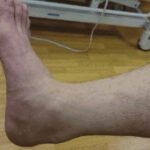Kidney stones are a common health issue, causing significant pain and discomfort to millions worldwide. But what exactly causes these painful formations in our kidneys? Understanding the reasons behind kidney stone development is the first step towards prevention. This article delves into the primary causes of kidney stones and offers actionable advice on how to reduce your risk.
Dehydration: A Major Culprit
One of the most significant and modifiable risk factors for kidney stones is dehydration. When you don’t drink enough fluids, especially water, your urine becomes more concentrated. This means there’s less fluid to dilute substances like calcium, oxalate, and uric acid, which can then clump together and form stones.
Dr. Motamedinia, a leading expert in kidney health, recommends drinking eight to ten glasses (64 to 80 ounces) of water daily. This can include beverages like coffee, tea, and juice, but it’s crucial to limit or avoid dark cola drinks. Dark colas contain phosphoric acid, which acidifies urine and can contribute to the formation of certain types of kidney stones. Instead, focus on consistent water intake throughout the day to maintain proper hydration and dilute urine concentration.
Dietary Factors and Kidney Stones
Diet plays a crucial role in kidney stone formation. Certain dietary habits can increase your risk, while others can be protective.
The DASH Diet Advantage
Studies have shown that the Dietary Approaches to Stop Hypertension (DASH) diet can effectively reduce the risk of kidney stones. This diet emphasizes fruits, vegetables, and whole grains while limiting saturated fats, tropical oils, and fatty meats. The DASH diet promotes a less acidic dietary approach, which is beneficial in preventing kidney stones.
Calcium: Friend or Foe?
Contrary to some misconceptions, adequate calcium intake is actually beneficial in preventing kidney stones. Calcium in the digestive tract can bind to oxalate, a substance that contributes to stone formation, and prevent its absorption into the bloodstream and kidneys. Include calcium-rich foods like milk, cheese, yogurt, and leafy greens in your diet. For those who are lactose intolerant, calcium-fortified soy and oat milk are excellent alternatives. The recommended daily calcium intake for adults ranges from 1,000 to 1,200 milligrams, depending on age and sex, as detailed by the National Institutes of Health (NIH).
Sodium Intake: Less is More
Excessive salt consumption can increase the risk of kidney stones. High sodium intake can cause your body to excrete more calcium into the urine, increasing the likelihood of stone formation. The U.S. Food and Drug Administration (FDA) recommends limiting sodium intake to less than 2,300 milligrams per day. Reading food labels on packaged and prepared foods is essential to monitor and reduce your sodium intake effectively.
Underlying Medical Conditions and Medications
Certain medical conditions and medications can also elevate your risk of developing kidney stones.
Health Conditions
Conditions like gout, obesity, and diabetes mellitus (including type 1, type 2, and gestational diabetes) are associated with a higher risk of kidney stones. These conditions can alter urine composition and increase the excretion of stone-forming substances.
Medications
Certain medications, such as diuretics (water pills) and calcium-based antacids, can also increase the risk of kidney stones. Diuretics can alter urine volume and composition, while calcium-based antacids can increase calcium levels in the urine. If you are taking these medications, discuss your kidney stone risk with your healthcare provider.
Family History: Is it Genetic?
A family history of kidney stones is another significant risk factor. Research is ongoing to determine whether this is due to genetic predisposition or shared dietary and lifestyle habits within families. If you have a family history of kidney stones, it’s especially important to adopt preventive measures like adequate hydration and a healthy diet.
Conclusion: Taking Control of Kidney Stone Prevention
While kidney stones can be incredibly painful, understanding the primary causes empowers you to take proactive steps towards prevention. Prioritizing hydration, adopting a balanced diet like the DASH diet, maintaining appropriate calcium and sodium intake, and being aware of underlying health conditions and medications are crucial strategies. By making informed lifestyle choices, you can significantly reduce your risk of kidney stones and promote long-term kidney health.
